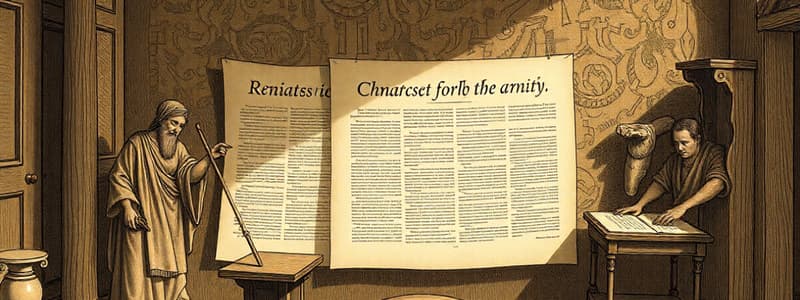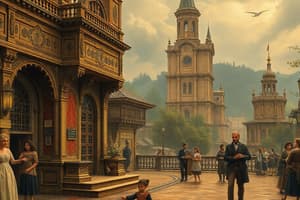Podcast
Questions and Answers
What was a key belief of humanists regarding human existence?
What was a key belief of humanists regarding human existence?
- Human experiences are irrelevant to personal growth.
- There is more to life than simply existing. (correct)
- Human potential is limited by external forces.
- Human existence is primarily about survival.
Which language best represents the idea of vernacular as used in a specific location?
Which language best represents the idea of vernacular as used in a specific location?
- Mandarin in Canada.
- German in France.
- Spanish in Italy.
- English in England. (correct)
Which philosophical school was the most prominent in ancient times?
Which philosophical school was the most prominent in ancient times?
- Existentialism.
- Epicureanism.
- Stoicism. (correct)
- Rationalism.
What is a characteristic feature of artistic achievements during the Renaissance?
What is a characteristic feature of artistic achievements during the Renaissance?
Flashcards
Humanist definition
Humanist definition
People who valued human potential and experiences beyond mere existence.
Printing press function
Printing press function
A 15th-century device for quickly printing text.
Vernacular language
Vernacular language
The everyday language of a specific region or group (e.g., English in England).
Ancient Greek philosophical roots
Ancient Greek philosophical roots
Signup and view all the flashcards
Prominent philosophy school
Prominent philosophy school
Signup and view all the flashcards
Study Notes
Renaissance Key Concepts
- Stoicism: Belief that life should be accepted without complaint.
- Philosophy: Study of how people live and what they do.
- Christianity: Belief system that united many lands.
- Arab World: Region (primarily Middle East) where Arab people lived.
- Renaissance: Period of rediscovering Greek and Roman knowledge and spirit.
- Humanists: People who believed in human potential and more in life than simply existing.
- Printing Press: Device that allowed for quick text printing.
- Vernacular: Particular language spoken in a specific place (e.g., English).
Why Did People Forget the Greeks and Romans?
- Philosophy's Origin: First developed in Ancient Greece by philosophers like Socrates.
- Prominent School: Stoicism was a crucial school of philosophy.
- Stoic Philosophy: Encouraged people to accept life and be curious about the world.
- Church's Power: Growth in power after the fall of Rome reduced curiosity.
- Arab World Developments: Scientific and mathematical advancements within the Arab World.
- House of Wisdom: Important site for thinking in the Arab world, located in Baghdad.
Why Did the Renaissance Develop in Italy?
- Rebirth of Greek/Roman Ideas: Renaissance was a rebirth of Greek and Roman ideas/spirit.
- Leonardo da Vinci: Example of Renaissance person (inventor, artist, learner).
- Humanist Research: Humanists sought forgotten Greek and Roman texts.
- Factors of Development: Italy's wealth, humanist ideas, fall of Constantinople, printing press, and trade encouragement.
- Ideas Spread: Humanist interest in human potential led to ideas spread.
- Printing Press Role: Helped spread Greek and Roman knowledge quickly.
- Scholarly Migration: Scholars from Constantinople brought Greek/Roman knowledge to Italy.
How Did the Renaissance Affect the World?
- Exploration: Western explorers (e.g., Vasco da Gama, Christopher Columbus) looked for new routes.
- World Exploration Drive: The Renaissance led to a desire to explore the world.
- Artistic Explosion: Stunning art emerged, such as that of Michelangelo.
- Michelangelo's Sistine Chapel: Famous artistic work celebrating the Renaissance.
- Challenging Authority: Renaissance encouraged people to question church authority.
- Scientific Challenges: People like Copernicus challenged the Earth-centered view of the universe.
- Bibles Translated: Humanists pushed for translations of the Bible into common languages.
- Changing Religious Views: The Renaissance changed how people thought about religion and God.
Studying That Suits You
Use AI to generate personalized quizzes and flashcards to suit your learning preferences.




